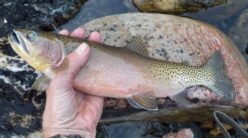A 41-year-old Salem man who recently found a bear cub that he said appeared to be nearly dead and brought to a wildlife rehab center has been warned, but not cited, for removing the cub from his habitat, according to Oregon State Police.
“It was laying on its back,” Corey Hancock said, “barely moving. It twisted a couple times. Its paws weren’t moving. It wasn’t breathing. It was dying.”
Hancock said he wasn’t sure what to do and didn’t know if the bear’s mother was nearby. So he waited and watched the cub for 10 minutes. No other bears showed up and the cub still was barely breathing. So Hancock said he wrapped it in his flannel.
“I ran back to the car,” he said, holding the bear, which he estimates weighed between two and three pounds. He said he ran for a mile and a half. When he got to the car, he told us that he “gave it some little rescue puffs like it was a baby.”
“It didn’t have any vitals that I could tell,” he said. “I tried to tickle its feet and it wouldn’t do anything.”
On the drive into Salem, according to Hancock, the bear was touch and go.
“It would take like a breath like every minute and a half,” he said. “I pulled over a couple times and debated on whether he was dead or alive.”
But Hancock said every time he pulled over, the cub would take a breath.
He posted about the cub on Facebook and people sent him suggestions about where to take it. Finally someone from Turtle Ridge Wildlife Rehab, which was closed, opened to accept the bear cub.
When Hancock arrived at Turtle Ridge, he said, an employee put the cub on on a heat blanket and injected him with some electrolytes.
“He start warming up and breathing better,” Hancock said.
The rehab facility said they stayed up all night and the cub was hydrated and starting to move around.
Hancock said he visited Turtle Ridge later and saw the cub, which was active, “growling and biting on his cage.”
Charles Harmansky-Johnson of Turtle Ridge wrote in an email that they received “a cold, severely dehydrated, emaciated, and lethargic black bear cub.”
“The cub, nicknamed ‘Elkhorn,’ received care throughout the night,” Harmansky-Johnson wrote. “After several rounds of subcutaneous fluids, his hydration and body temperature finally normalized.”
“Nearly 12 hours later,” Harmansky-Johnson continued, “Elkhorn is showing significant signs of improvement. He’s being more vocal, attempting to stand and move around.”
Harmansky-Johnson called Hancock a “hero.”
The male cub is now in the custody of the Oregon Department of Fish and Wildlife. According to Harmansky-Johnson, the cub “will have a full health exam, and pending the results, he will be placed in the care of an out-of-state center to continue his rehabilitation.”
While ODFW said they didn’t want to speculate on the exact situation of Hancock’s cub, they said that people frequently find baby animals in the woods in the spring and “rescue” them, when in fact they don’t need to be rescued.
“We advise people to never assume a young animal is orphaned unless they saw the mother die,” said Michelle Dennehy, a spokesperson for ODFW. “It is quite common for young to temporarily be left alone in the wild.”
“We see this happen a lot in the spring,” Dennehy said, “with all sorts of young animals including birds, deer fawns and elk calves, and even cougar kittens, getting picked up because people assume they are orphaned.
“Removing young animals from the wild is not a good thing to do for them. These animals miss the chance to learn important survival skills from their parent.”
Animals that are taken from their habitats have a tough road ahead, Dennehy said. That future can include being reintroduced into the wild, spending time in a rehabilitation center, or even a lifetime of captivity in a zoo.
For a bear in Oregon, this can be especially complicated since there are no licensed bear-rehab facilities in the state.
“It’s bad for wildlife and can be dangerous for people,” Dennehy said, “it’s also against the law.”
Dennehy doesn’t know what will happen yet with Hancock’s cub. But she emphasized that if people come across what appears to be an abandoned baby animal in the forest, they should call ODFW at (503) 947-6000, or the Oregon State Police, or a registered wildlife rehabber before attempting to move the animal.
“Never assume,” she said. “The mother might be coming back for it.”



